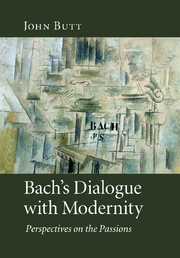Book contents
- Frontmatter
- Contents
- Preface
- List of abbreviations
- Introduction
- 1 Bach's Passions and the construction of early modern subjectivities
- 2 Bach's Passions and the textures of time
- 3 The hermeneutic perspective – negotiating the poles of faith and suspicion
- 4 The voices we hear and the construction of narrative authority
- 5 Between rhetoric and dialectic – Bach's inventive stance
- Afterword
- Appendix
- Bibliography
- Index
Introduction
Published online by Cambridge University Press: 26 February 2010
- Frontmatter
- Contents
- Preface
- List of abbreviations
- Introduction
- 1 Bach's Passions and the construction of early modern subjectivities
- 2 Bach's Passions and the textures of time
- 3 The hermeneutic perspective – negotiating the poles of faith and suspicion
- 4 The voices we hear and the construction of narrative authority
- 5 Between rhetoric and dialectic – Bach's inventive stance
- Afterword
- Appendix
- Bibliography
- Index
Summary
Is there really any need for another study of Bach's Passions, particularly when these (and the Matthew Passion in particular) have inspired nearly two centuries of critical literature? When I first began to consider this project, the one approach that did not seem sufficiently explored was the detailed and comparative analysis of both Passions together. However, the customary methods of approaching Bach's choral works – surveying the compositional history, verbal texts, musical forms, styles and genres – soon seemed inadequate in light of the sheer emotional and narrative scale of the Passions. Perhaps this is partly because they relate to a story that is seminal to Western history. But this could hardly be the entire reason, given that the Gospel narratives have been set so many times to music. Bach's music interacts with the various levels of text in a way that seems to go beyond merely a successful presentation of the story and its attendant affects.
A complex of questions soon began to dominate my thought on the Passions: both of them originated in the relatively local purpose of furnishing the Leipzig liturgical year (they were heard in Leipzig only intermittently between 1724 and 1750), and the vast majority of recent research has centred on details of their composition and performance, together with issues of their original theological purpose and meaning. Yet both Passions have found a deep resonance in a wide range of historical and cultural contexts, most utterly foreign to Bach's Leipzig.
- Type
- Chapter
- Information
- Bach's Dialogue with ModernityPerspectives on the Passions, pp. 1 - 35Publisher: Cambridge University PressPrint publication year: 2010



